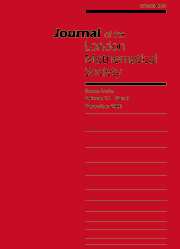Article contents
ABSOLUTE CONTINUITY FOR RANDOM ITERATED FUNCTION SYSTEMS WITH OVERLAPS
Published online by Cambridge University Press: 04 January 2007
Abstract
We consider linear iterated function systems with a random multiplicative error on the real line. Our system is $\{x\mapsto d_i + \lambda_i Y x\}_{i=1}^m$, where $d_i\in {\mathbb R}$ and $\lambda_i>0$ are fixed and $Y> 0$ is a random variable with an absolutely continuous distribution. The iterated maps are applied randomly according to a stationary ergodic process, with the sequence of independent and identically distributed errors $y_1,y_2,\dotsc$, distributed as $Y$, independent of everything else. Let $h$ be the entropy of the process, and let $\chi = {\mathbb E}[\log(\lambda Y)]$ be the Lyapunov exponent. Assuming that $\chi < 0$, we obtain a family of conditional measures $\nu_{\bf y}$ on the line, parametrized by ${\bf y} = (y_1,y_2,\dotsc)$, the sequence of errors. Our main result is that if $h > |\chi|$, then $\nu_{\bf y}$ is absolutely continuous with respect to the Lebesgue measure for almost every ${\bf y}$. We also prove that if $h < |\chi|$, then the measure $\nu_{\bf y}$ is singular and has dimension $h/|\chi|$ for almost every ${\bf y}$. These results are applied to a randomly perturbed iterated function system suggested by Sinai, and to a class of random sets considered by Arratia, motivated by probabilistic number theory.
Information
- Type
- Notes and Papers
- Information
- Copyright
- The London Mathematical Society 2006
- 13
- Cited by

